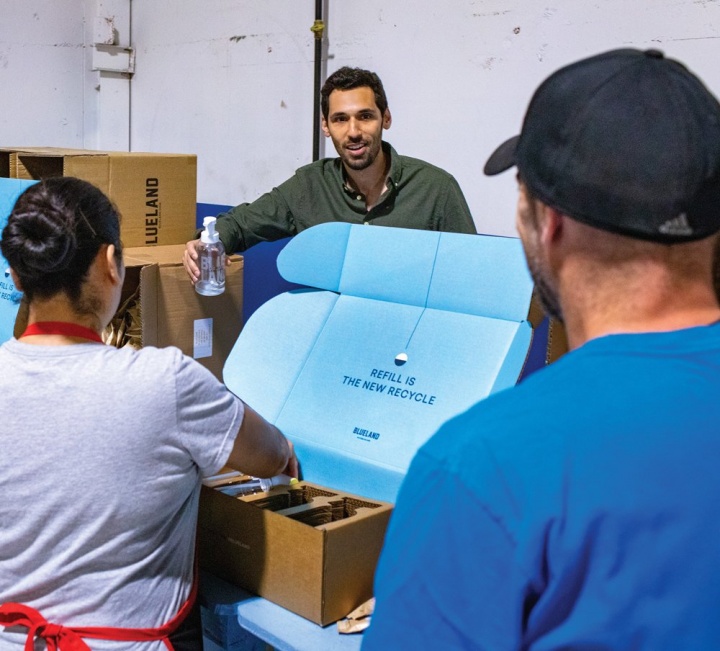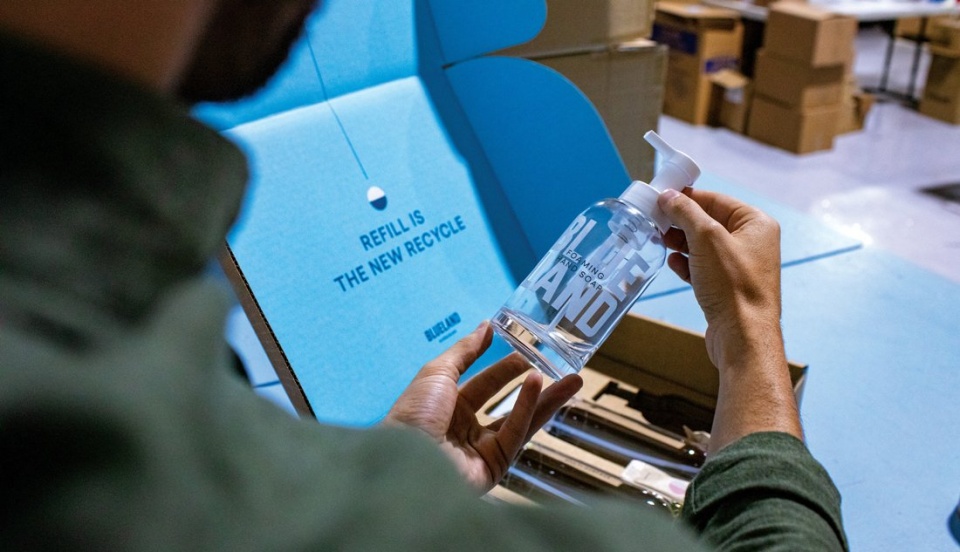John A. Mascari ’08 aims to make
your cleaners greener.
Columbia College | Columbia University in the City of New York
John A. Mascari ’08 aims to make
your cleaners greener.

Mascari at Blueland’s warehouse in Newark, N.J.
Jörg Meyer
John A. Mascari ’08 was 7 years old when he stopped eating his buffalo wing mid-bite.
He noticed what looked like a vein and thought about the lion posters and bison wallpaper he saw every night before bed, and about the summer camp he attended that was on the same property as a cow farm. That night, to the consternation of his meat-eating Italian household, Mascari became the first in his suburban Buffalo community to stop eating all meat and seafood. (This was the ’90s.) It was social suicide. (This was Buffalo.)
Like many of us, Mascari lost some of his idealistic resolve as he grew up. But a few years ago, with Earth burning, glaciers melting and oceans choking on plastic, Mascari found his thoughts returning to his childhood commitment. Already an entrepreneur, he didn’t just start composting or bringing a tote bag to the grocery store — he went all in. From his home in Boulder, surrounded by majestic mountains, Mascari made a new pact: his next business would be devoted to helping the environment. You could even say he’s making up for lost time. Because nearly three decades after his first pact, he has resolved to rid the world of plastic — starting with your cleaning supplies.
Eight months ago, Mascari and co-founder Sarah Paiji Yoo debuted their eco-venture Blueland to much fanfare. The online company launched with $3 million in venture capital (Justin Timberlake is an investor), won the Harvard Business School Global Alumni New Venture Competition and was featured in The Wall Street Journal, Forbes, Fast Company and Vogue. In September, Blueland appeared on ABC’s Shark Tank and landed a deal with investor Kevin O’Leary, leading to a valuation of $9 million.
The winning pitch? Instead of buying a new bottle of Windex every time you run out, you have one “Forever” bottle you refill with just-add-water cleaning tablets that clock in at a mere $2 each.
The ambitious goal is to eliminate single-use plastic while reducing carbon emissions, as the tablets are 300 times lighter to ship than conventional equivalents. And that’s just to start. Mascari wants to transform the entire $60 billion cleaning supply industry so it’s non-toxic, waste-free and still profitable.
“The world is in crisis mode,” Mascari says, his baritone (with a hint of upstate New York) filling the room. “I want Blueland to be a definitive case study about how to build a business that thinks first about the environment, and is still more successful than any business that’s come before it.”
If Mascari sounds confident, it might be because he already hit the startup jackpot once before. His first business was inspired by his then-pregnant sister’s difficulty finding a balance of nutrients in her diet. Fresh out of Harvard Business School, at only 27 years old, Mascari created Bundle Organics, the first line of non-GMO, vitamin-fortified, pasteurized juices designed for pregnant women.

Jörg Meyer
Bundle was Mascari’s first experience with building a supply chain: the manufacturing, packaging and delivery process that transforms an idea into a viable product. It took him a relentless pavement-pounding year to convince his preferred supplier (whose other clients were giants like Pepsi and Coke) to take a chance on an unproven startup.
Lifestyle influencer Whitney Port — a Bundle consumer and fan whom Mascari recruited as the company’s chief brand director — witnessed this tenacity firsthand. “John has the ability to redirect when people say no,” Port says. “He will somehow creatively turn it into a yes. He’s always trying to figure out ways around roadblocks.”
His persistence paid off. Bundle made it to national retail shelves, including Target and buybuyBaby. Four years after launching, Mascari sold Bundle to natural product powerhouse 1908 Brands. Mascari can’t reveal the dollar amount, but more important than the money was finding the right mission-based partner. “When I sold Bundle, I was deliberate in finding it a very eco-focused home,” he says. “There were other potential investors, but I loved knowing that the business would be joining a company with environmentalism at its core.”
The inspiration for Blueland started with a close look at a bottle of Windex. Turns out the ingredients are 97 percent water and only 3 percent active cleaning agent. This “seemed bananas” to someone with Mascari’s beverage background. Why ship a product that’s mostly water around the world when you can just use the tap and reduce your carbon footprint and operating costs?
After realizing the water ratio applied to most cleaning supplies, Mascari and Paiji Yoo — who met at Harvard — recruited chemist Syed Naqvi from non-toxic cleaning giant Method to join the founding team as their head of development. Blueland launched one year later, just in time for Earth Day 2019.
As CEO, Paiji Yoo is the face of the brand, handling marketing, public relations and big-picture strategy. As COO, Mascari is its legs, keeping the day-to-day operations running. During the Shark Tank taping, Paiji Yoo and Naqvi pitched the concept while Mascari sat in a conference room with all of his spreadsheets in case they needed to call him with a question.
“Startups are all about operating effectively in a resource-constrained environment. There is no one better to have in the trenches than John,” Paiji Yoo says. “He is really running all things: manufacturing, sourcing, warehouse and fulfillment. And our partners are all across the country — he will fly there and fix any problems himself.”
“I joke that if I ever get a tattoo, it will probably be the tablet itself.”
In fact, Blueland’s press-friendly launch date wouldn’t have happened if it weren’t for Mascari’s sleeves-up ethos. The weekend before, Mascari learned the branded tablet wrappers wouldn’t arrive in time to make their deadline. That night, he booked the last flight out to the manufacturer in Florida, where he hand-stickered 3,000 tablets.
Similarly, when there’s an unexpected spike in sales, Mascari hops on a red-eye to Newark, N.J., and spends the day at the warehouse, packing boxes to ensure orders don’t fall behind. “What am I going to do? Sit at my computer and say, ‘Where are these boxes? Where are these boxes?’ It’s important for me to go there and do it,” he says.
Making a product that didn’t exist begins with cobbling a supply chain together from scratch.
The first problem? The tablets. “I joke that if I ever get a tattoo, it will probably be the tablet itself, or that tablet wrapper,” says Mascari, flashing his one-dimpled smile, “because they were so impossible to put together.”

JÖRG MEYER
Cleaning companies don’t employ tablet-making machines, as their products are liquid-based. To produce Blueland’s 94 percent bio-based tablets (made entirely of ingredients on the EPA’s safer chemical ingredients list), Mascari visited 50 manufacturers ranging from medication makers to candy factories, searching for the right type of machinery.
Then there was the plastic problem — to avoid using it, Mascari’s tattoo-worthy wrapper had to be developed without impacting the quality, smell or look of the tablet over time.
“There was no way we were going to package our product in something that wasn’t compostable, recyclable and safe for children,” Mascari says. “Believe me, it would have been so easy to say, ‘We’ll just do less plastic,’ because those machines are in abundance.”
Blueland was rewarded with the highest rating by leading environmental agency Cradle to Cradle. Even the artwork on the “Forever” bottles was put to the test, as many label paints contain known carcinogens. “Our suppliers think it’s insane that we’re sourcing inks and dyes from different places, but we wanted to know what was in them down to the molecular level, so we knew exactly what we were putting into a consumer’s home,” Mascari says.
Although there are plenty of eco-friendly cleaning products out there, Mascari isn’t worried about competing with these bigger players. He considers Blueland — which has 18 patents pending — to be an entirely different category. “Asking a traditional liquid cleaning company to reinvent itself as a dry tablet company is basically saying, ‘Clear the deck and start over,’” he says.
Bringing this vision to life has been exhausting. A former investment banker, Mascari is no stranger to late nights in the office — a work ethic, he says, that was cultivated as publisher of Spectator. He works from sunrise to well past sunset, with breaks for food and exercise. This doesn’t include Sunday nights, when he stays up till 2:30 a.m.
to work with his partners in Hong Kong, where it’s Monday morning.
There is no guarantee that Blueland will have the same success as Bundle, and yet Mascari can’t imagine spending 15-hour days doing anything else. “To go through the process of trying to build a business again, which is a grind, it has to be tied to something that is going to pull you out of bed every day,” Mascari says. “This is brand new and yet already feels like my life’s work.”
Yelena Shuster ’09 has written for The New York Times, Cosmopolitan, InStyle and more. Her CCT Fall 2018 cover story, “Star Power,” won a Folio: Eddie Honorable Mention and a CASE Silver Award. She founded and runs TheAdmissionsGuru.com, where she edits admissions essays for college and graduate school applications.

Published three times a year by Columbia College for alumni, students, faculty, parents and friends.
Columbia Alumni Center
622 W. 113th St., MC 4530, 6th Fl.
New York, NY 10025
212-851-7852
cct@columbia.edu

Columbia Alumni Center
622 W. 113th St., MC 4530, 4th Fl.
New York, NY 10025
212-851-7488
ccalumni@columbia.edu